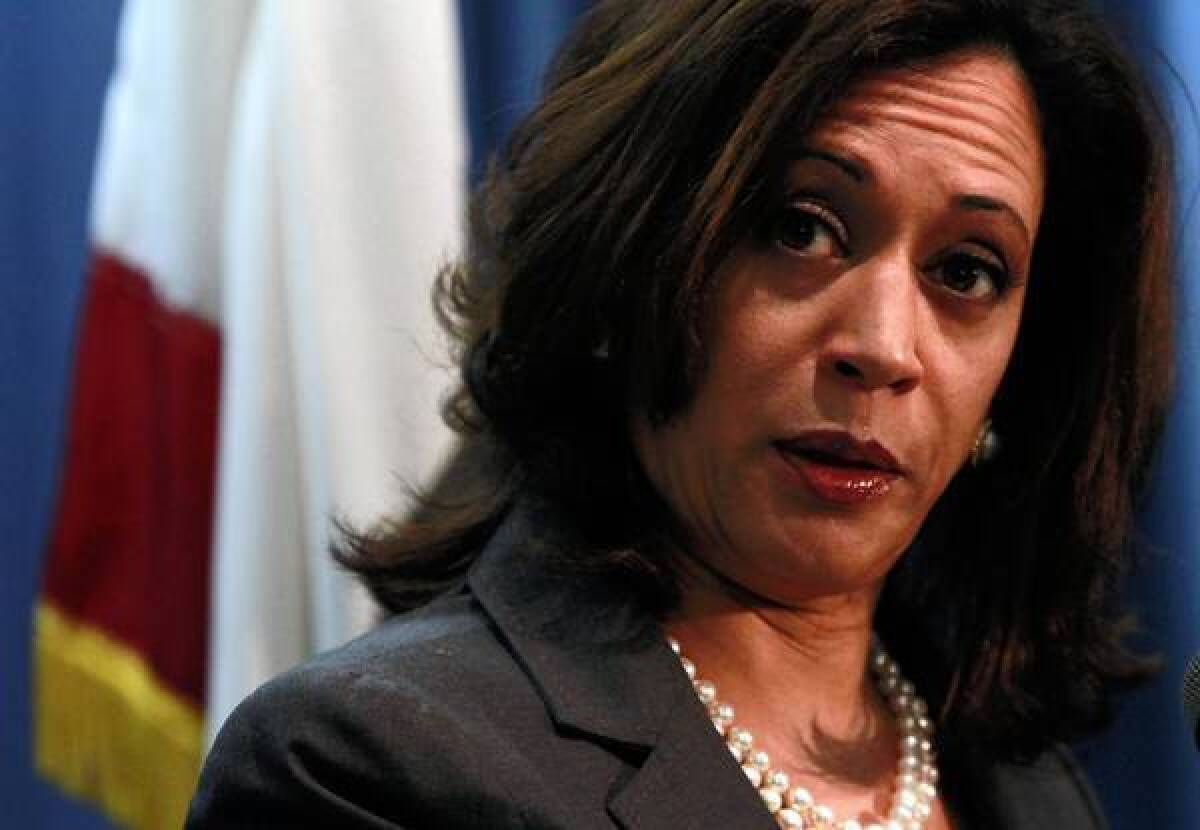Supreme Court is urged to reject Michigan affirmative action ban

WASHINGTON â California Atty. Gen. Kamala Harris urged the Supreme Court on Friday to strike down a Michigan voter initiative that bans âpreferential treatmentâ based on race in its state colleges and universities, a ruling that would likely invalidate a similar ban approved by Californiaâs voters in 1996.
These bans on affirmative action âviolate the Equal Protection Clauseâ of the Constitution, Harris said, by âerecting barriers to the adoption of race-conscious admissions policies.â
For a second term in a row, the high court is set to consider a major test of affirmative action in state universities. In June, the court revived a white studentâs challenge to a race-based admissions policy at the University of Texas. In October, the court will consider a constitutional challenge that comes from the opposite direction. Lawyers representing black and other minority students are contesting Michiganâs ban on affirmative action.
Separately, the University of Californiaâs president and 10 chancellors filed their own brief Friday highlighting the ban on affirmative action. âMore than 15 years after Proposition 209 barred consideration of race in admissions decisions ⦠the University of California still struggles to enroll a student body that encompasses the broad racial diversity of the state,â they said.
In 2006, Michiganâs voters approved Proposition 2, 58% to 42%. Using the words of the California measure, the ban said Michiganâs public universities âshall not discriminate against, or grant preferential treatment to, any individual or group on the basis of race, sex, college, ethnicity or national origin.â
Lawyers challenging the measure say that because it became part of the state constitution, they were deprived of the equal chance to lobby for affirmative-action policies in the state Legislature or before university officials. They say they want a Supreme Court ruling that would also wipe out the nearly identical voter-approved bans in California, Arizona, Washington, Nebraska and Oklahoma.
In November, they won an 8-7 ruling by the Cincinnati-based 6th Circuit Court of Appeals, which declared unconstitutional Michiganâs Proposition 2. It âundermines the Equal Protection Clauseâs guarantee that all citizens ought to have equal access to the tools of political change,â said Judge R. Guy Cole Jr. His opinion spoke for all eight Democratic appointees to the appeals court, while the seven Republican appointees dissented.
Michigan Atty. Gen. Bill Schuette appealed, and the court will hear arguments in the case of Schuette vs. Coalition to Defend Affirmative Action on Oct. 15.
Harrisâ brief for California was also signed by Lisa Madigan of Illinois and four other attorneys general, though none have similar voter measures that turn on the outcome. Usually, a stateâs top attorneys intervene in pending Supreme Court cases to defend their stateâs laws. In this instance, however, the California attorney general is asking the justices to hand down a ruling that would void a provision in Californiaâs Constitution.
Last year, Harris also refused to defend Californiaâs Proposition 8 and its prohibition on same-sex marriage after it had been struck down by a judge in San Francisco. The Supreme Court in June, citing the stateâs refusal, said the private sponsors of the ballot measure did not have legal standing to defend it in court.
Harris took office as attorney general in January 2011. Her website describes her as âthe first woman, the first African American and the first South Asian to hold the office in the history of California.â
Her friend-of-the-court brief read: âCalifornia has a particular interest in the outcome of this case because, as in Michigan, its voters amended its Constitution to add language virtually identical to the constitutional provision at issue in this case.... It is particularly important for states with large nonwhite populations to ensure that students of all races have meaningful access to their public colleges and universities.â
She lauded the âwell-reasoned decisionâ of the 6th Circuit and said the students and citizens should be free to press for ârace-conscious admissions policies.â
Harrisâ brief for California was also signed by the top attorneys from five other states and the District of Columbia: Madigan of Illinois, David Louie of Hawaii, Thomas Miller of Iowa, Gary King of New Mexico, Ellen Rosenbaum of Oregon and Irvin Nathan from Washington, D.C.
More to Read
Sign up for Essential California
The most important California stories and recommendations in your inbox every morning.
You may occasionally receive promotional content from the Los Angeles Times.











